Pennsylvania Drug Laws May Limit Syringe Services
7:52 minutes
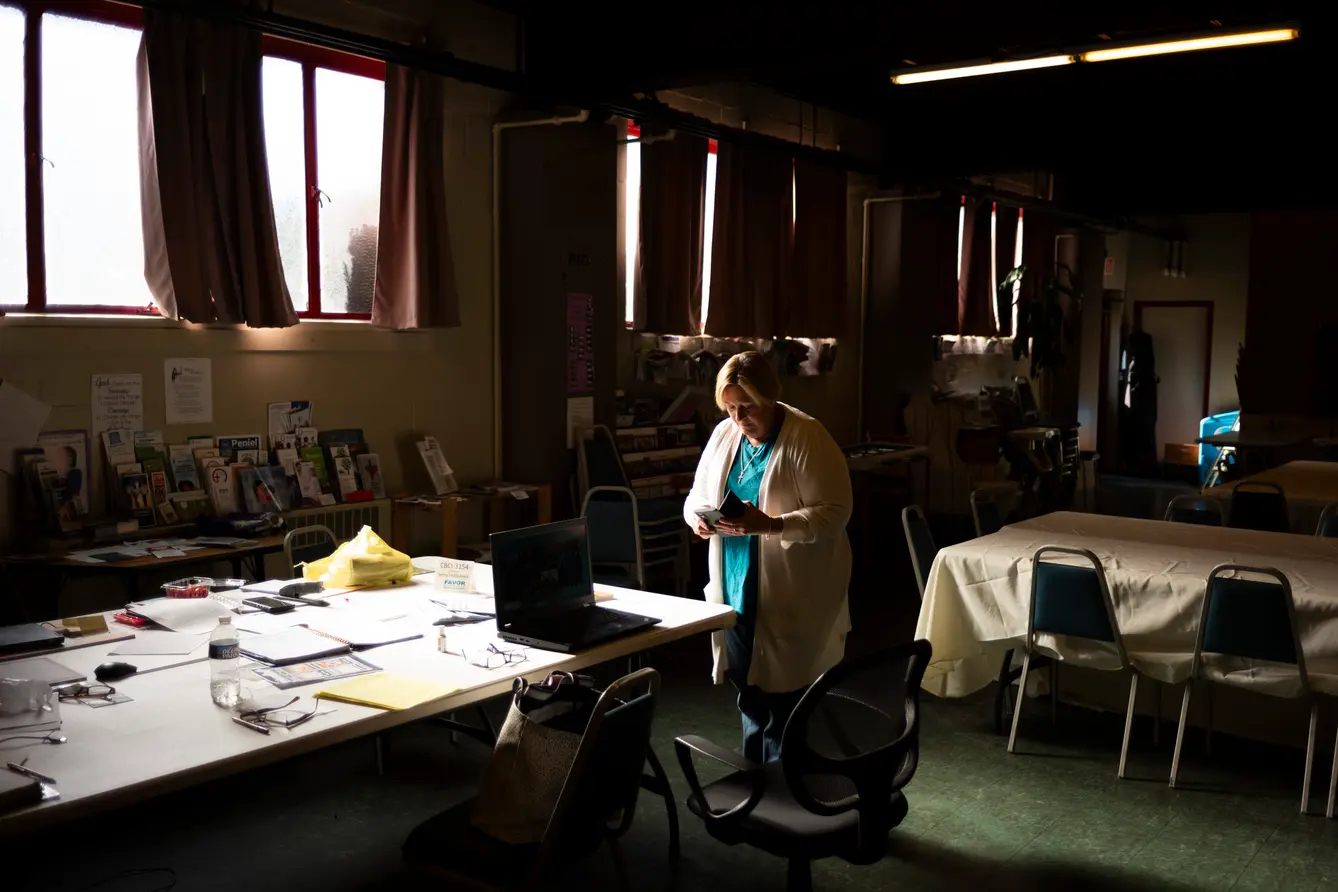

This article is part of The State of Science, a series featuring science stories from public radio stations across the United States. This story was originally co-reported by WESA Public Radio and Spotlight PA. Spotlight PA is an independent, nonpartisan, and nonprofit newsroom producing investigative and public-service journalism that holds power to account and drives positive change in Pennsylvania.
In the basement of a former Catholic church, in a tiny Westmoreland County town battling with a drug epidemic, Kim Botteicher risks arrest to help those who are addicted to opioids and other substances.
Botteicher runs a small syringe services program that provides people with supplies that make it less risky to inject drugs. That includes alcohol wipes, tourniquets, and sterile syringes. The items are part of a broader approach for her center, which runs support groups, helps people find housing and jobs, and connects them with long-term treatment.
The danger for Botteicher and others who support this approach is that, under Pennsylvania law, it’s a misdemeanor crime to distribute drug paraphernalia. The state’s definition includes hypodermic syringes, needles, and other objects used for injecting banned controlled substances.
“Are they going to quit overnight because we ask them to? Nope,” Botteicher said of the people her program helps. “So let’s help them stay well until we can get them to that point.”
Pennsylvania is one of 12 states that do not implicitly or explicitly authorize syringe services programs through statute or regulation, according to a recent analysis. They are widely considered to be illegal outside of Allegheny County and Philadelphia, where officials have for decades used local health power to grant legal protection to people who operate syringe services programs.
These programs have widespread support in the medical community, and expanding them is listed as one of nine “Core Strategies” for the tens of billions of dollars coming to states as part of settlements with drug companies for their role in allegedly fueling the opioid epidemic. A coalition of state attorneys general reached the agreements with the companies.
Pennsylvania expects to receive more than $1.6 billion in opioid settlement funds, but the state’s ban makes it significantly harder for the money to directly support expanding syringe services in many places.
Some supporters of syringe services programs operate underground. Carla Sofronski, executive director of the Pennsylvania Harm Reduction Network, said she’s not aware of anyone ever facing criminal charges for doing so in the state, but noted the threat hangs over them, and they are taking a “great risk.”
And the state’s ban limits funding opportunities for these programs, while also hindering their ability to expand services and openly promote what they do.
“They all know that the need is greater than what they’re currently able to serve in those areas,” said Aaron Arnold, executive director of Prevention Point Pittsburgh, which has the approval of the Allegheny County government to operate there.
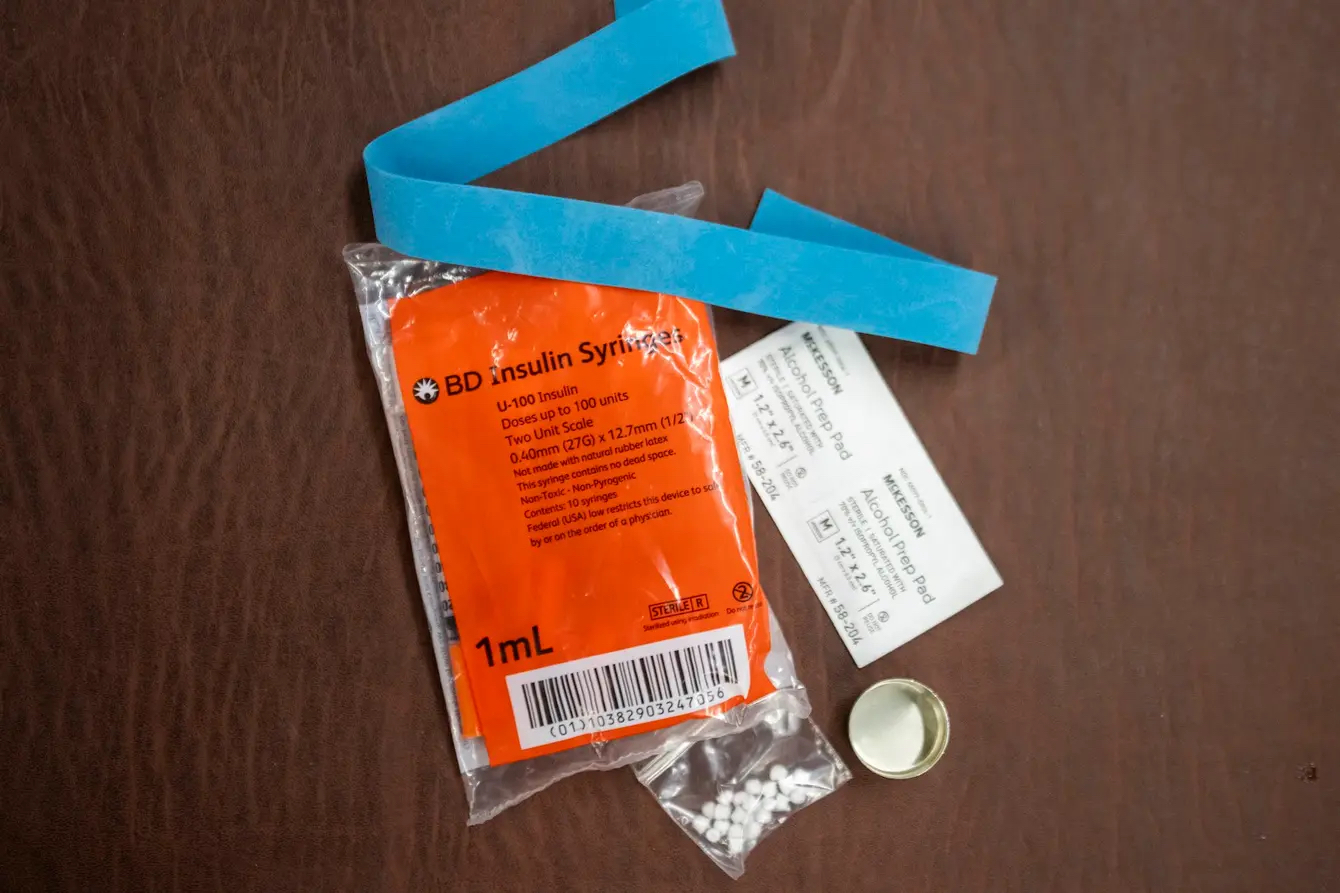
All of Pennsylvania’s neighboring states allow syringe services programs.
A host of studies have found syringe services to be an effective public health intervention. The CDC says they reduce HIV and hepatitis C infections, and that new users of the programs are more likely to enter drug treatment and more likely to stop using drugs.
A major 2017 report from the National Academies of Sciences, Engineering, and Medicine said that syringe services programs can help people who use drugs find treatment options, access the opioid overdose-reversal drug naloxone, and receive HIV testing and counseling.
Syringe services also have the support of the American Medical Association, and the World Health Organization offers a guide to starting and managing these programs.
Pennsylvania’s secretary of the Department of Drug and Alcohol Programs, Latika Davis-Jones, in May publicly suggested officials should use opioid settlement funds for this very purpose, saying “there’s an opportunity to be innovative in this space” and to look at “how they might support syringe services programs across the commonwealth.”
Some lawmakers in Harrisburg argue these programs help vulnerable people — and protect first responders and the broader public by reducing the presence of discarded used needles.
In North Carolina, global health organization Vital Strategies in January announced it awarded $1.5 million worth of matching funds in counties using opioid settlement money to expand community-based naloxone distribution and syringe services.
Pitt County in the eastern part of the state — about 80 miles from Raleigh — isn’t receiving those matching funds, but it’s using opioid settlement money on syringe services anyway.
After lawmakers legalized syringe services in the state in 2016, Diannee Carden-Glenn founded a program in the county. Her organization is named ekiM for Change, in honor of her oldest son, Michael Carden, a social worker who provided services and advocated for people who used drugs. He also struggled with addiction himself, and died in 2012 from a drug overdose at the age of 40, she said.
Late last year, Pitt County commissioners approved $100,000 in opioid settlement money for ekiM, specifically for harm reduction through its syringe services program. The all-volunteer organization serves about 150 people each Saturday in a building in Greenville, about a block from the county courthouse. The volunteers offer clean needles, naloxone, fentanyl test strips, syringe disposal, and other resources. They also help get people into treatment.
“Eventually, most everybody comes and asks for help. But it takes a long time to build that trust,” Carden-Glenn said. “I always say that every person that walks in the door is my son.”
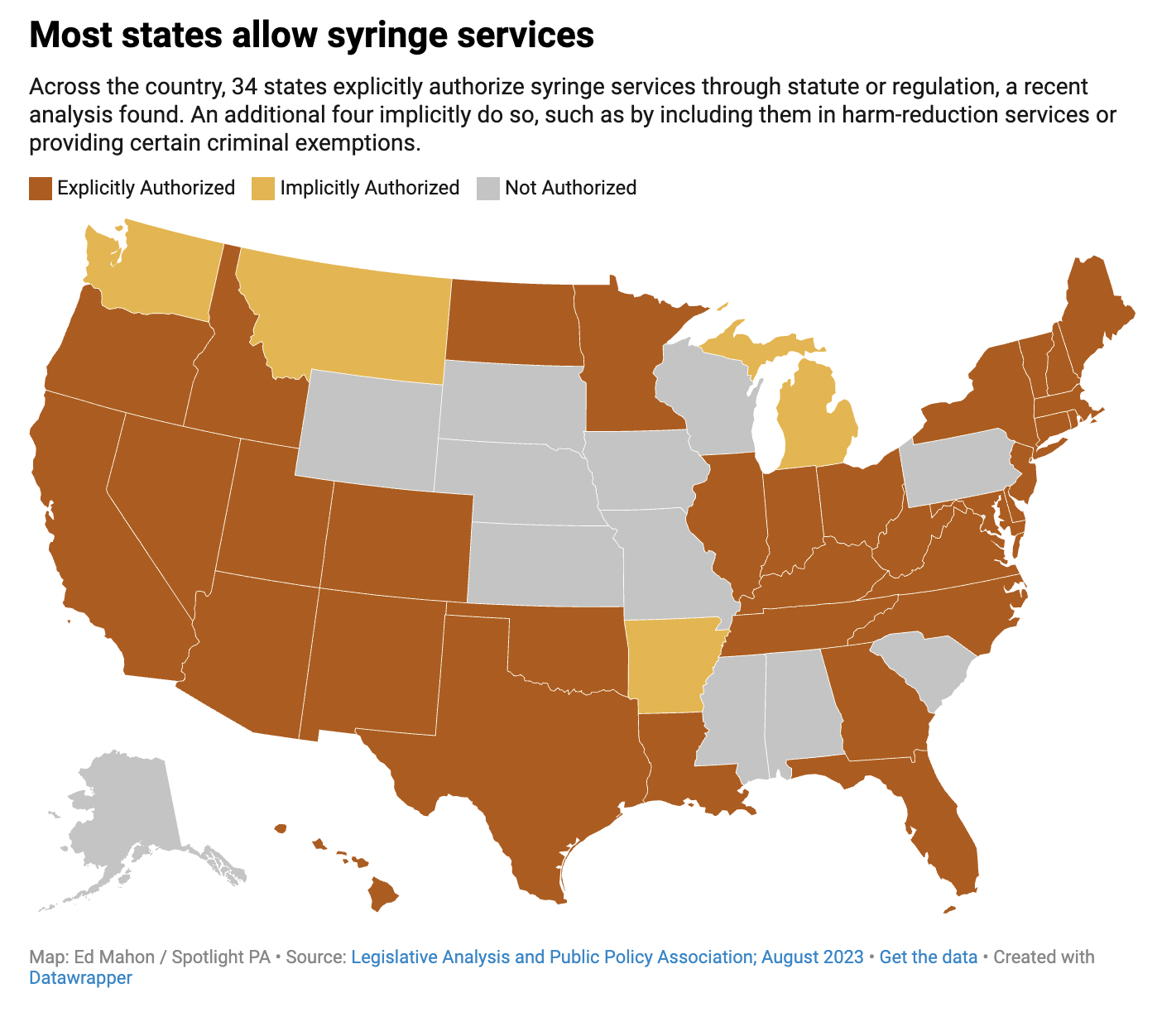
Needle exchange programs began openly operating in the United States in the late 1980s, and in the following years, a number of local governments used their public health powers to argue that state drug laws were “not intended to apply to bona fide disease control measures,” researchers at Temple University’s law school wrote in 1996.
A number of states have since authorized syringe services, but barriers remain.
Advocates and public health officials say syringe services are needed in all pockets of the state, but few places in Pennsylvania offer legal protections for the people that run them.
Allegheny County explicitly uses opioid settlement money to support syringe services — in a way that Spotlight PA and WESA didn’t find happening elsewhere in the state. According to Allegheny County’s public dashboard and officials there, it allocated $325,000 from its portion of opioid settlement funds to Prevention Point Pittsburgh’s syringe program, which operates five sites in Pittsburgh. The nonprofit also receives settlement money to operate a mobile clinic that connects people to opioid addiction medication, coordinates their ongoing care, and offers additional resources.
The organization expects to give out about 2 million syringes this year, an increase from last year, according to Arnold, the nonprofit’s executive director. As of mid-November, opioid settlement money has paid for all of the syringes and harm-reduction supplies that the organization bought this year to distribute at the sites.
“It was absolutely incredible to not have to fundraise every single dollar for the supplies that go out,” Arnold told Spotlight PA and WESA. “… It takes a lot of energy. It pulls away from actual delivery of services when you’re constantly having to find out, ‘Do we have enough money to even purchase the supplies that we want to distribute?’”
Allegheny County’s formal relationship with Prevention Point Pittsburgh goes back to the early 2000s, when officials declared a public health emergency for blood-borne infections and sanctioned syringe services, according to newspaper archives. In 2008, the county solidified the arrangement with an ordinance that cited a state law that gives certain governance powers to counties that have created their own health departments. Most Pennsylvania counties lack health departments and rely on public health nurses who are employed by the state.
County officials told Spotlight PA and WESA that rules around some other funding sources prevent them from spending the money on syringe services, but that wasn’t the case with opioid settlement money. It financially supports other programming at Prevention Point Pittsburgh, including funds for overdose prevention.
In Philadelphia, aboveground syringe services have been around even longer: In 1992, then-Mayor Ed Rendell, a Democrat, issued an executive order granting legal protections for people providing syringe services. In issuing the order, he cited the city’s health code and its power to respond to a public health emergency. A 2022 report from the Philadelphia Department of Public Health credited syringe services for a decline in new HIV cases that occurred in the years that followed.
Noëlle Foizen, director of the city’s Opioid Response Unit, said Philadelphia’s plan for opioid settlement money has so far not specifically prioritized syringe services because of the need for a range of programs and because other funding options exist for those services.
The city already provides financial support to Prevention Point Philadelphia, which is not affiliated with Arnold’s organization in Pittsburgh. Budget information provided by a spokesperson for the city’s Department of Public Health listed $900,000 in city general funds for Prevention Point Philadelphia’s syringe services program, plus about $275,000 in federal grant money the city provides for the program’s staffing. Other grant money flows through the city to support a range of different services from Prevention Point Philadelphia, including for medical services and medical case management.
The city’s opioid settlement plan does include $100,000 to support the outreach and education work — including hiring two harm-reduction coordinators — for another nonprofit that provides syringe kits, wound care kits, and other services in the city, according to officials with the city and the foundation partnering with Philadelphia for its grant program.
Scott Burris, director of the Center for Public Health Law Research at Temple University, has studied syringe services laws for decades and has argued that the Pennsylvania law banning drug paraphernalia was never intended to apply to the programs.
But he said there have not been court cases in Pennsylvania to clarify the true risks and protections for people operating these programs across the state, and the lack of action by the legislature creates a “chilling effect” outside Philadelphia and Allegheny County.
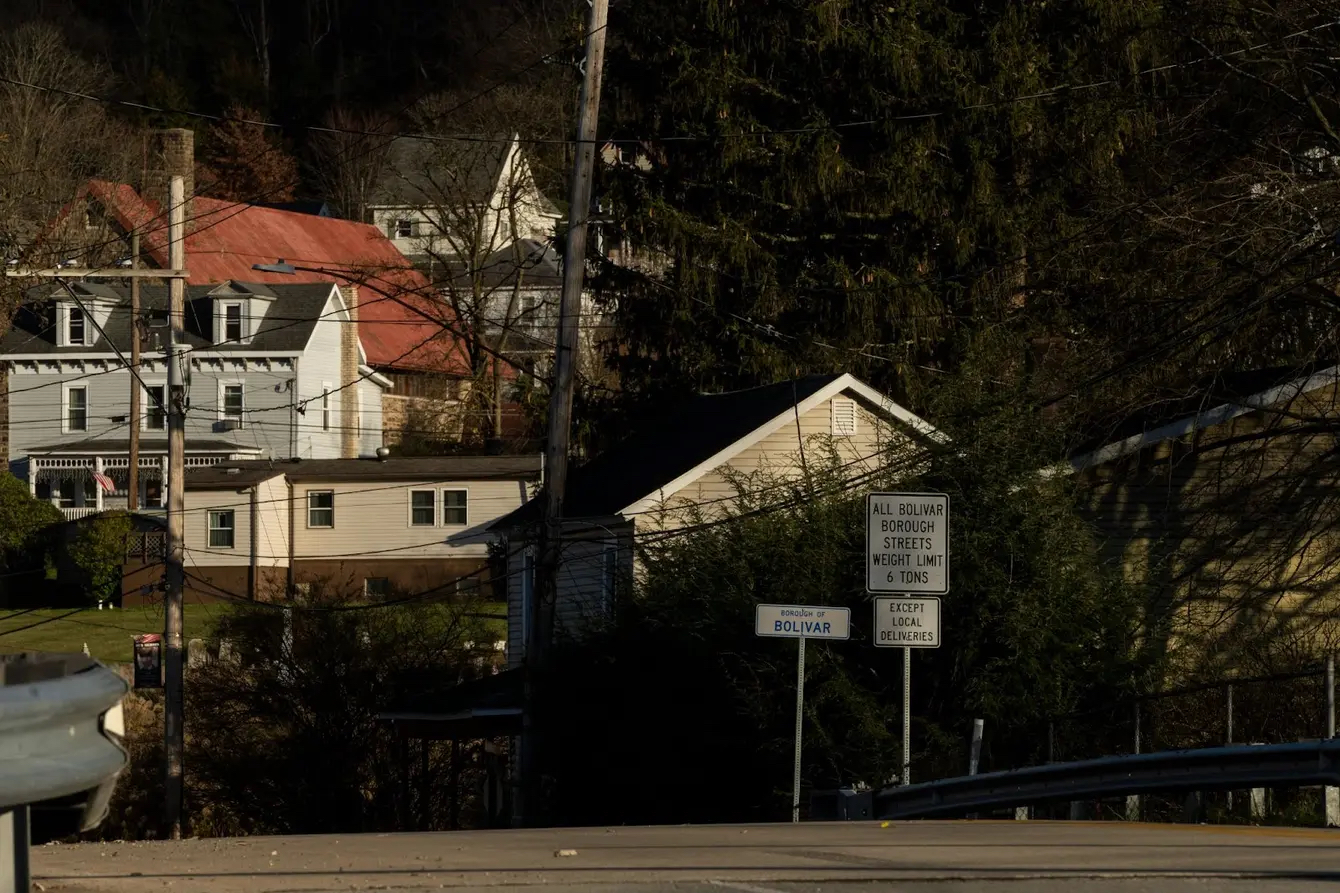
Three Pennsylvania counties — Cambria, Crawford, and Luzerne — were flagged among 220 counties in a national assessment of counties potentially vulnerable to the rapid spread of HIV, if introduced, and new or continuing high rates of hepatitis C infections among people who inject drugs. The analysis from the CDC was published in 2016.
Kate Favata, a Luzerne County resident who advocates for syringe services programs, said she started using heroin in her late teens and contracted hepatitis C during a period when she was sharing syringes.
“It was something I was ashamed of. You know, it made me feel almost like my life didn’t matter,” Favata said.
She eventually received treatment for hepatitis C and was cured. Favata is now in long-term recovery and works for a medication-assisted treatment program as a community engagement manager, trying to reduce stigma and help people access treatment. She says if it weren’t for the support and community she found at a syringe services program in Philadelphia, she doesn’t think she’d be alive today.
“It kind of just made me feel like I was in a safe space. And I don’t really know if there was like a come-to-God moment or come-to-Jesus moment,” she said. “But … I just wanted better.”
Highlands Health, which has its main clinic in Cambria County, provides free and charitable medical care and other services in Western Pennsylvania. Despite the legal risk, the organization has openly operated a syringe services program for several years, while also testing patients for infectious diseases, distributing overdose-reversal medication, and offering recovery options.
Rosalie Danchanko, Highlands Health’s executive director, said the organization’s patients — including people suffering wounds from xylazine — oftentimes wouldn’t go elsewhere for help.
But she said they’ve come to trust her staff. Danchanko thinks legalizing syringe services statewide would save lives and allow syringe services supporters to “open up the doors and not be afraid to serve.”
She hopes opioid settlement money can eventually help support her clinics.
“Why shouldn’t that wealth be spread around for all organizations that are working with people affected by the opioid problem?” she asked.
Even if legislation were to pass legalizing syringe services programs, it’s not clear how many local officials would want to spend opioid settlement funds or any other source of money on them.
That conflict was on display in Lancaster County in August when commissioners discussed how to allocate settlement dollars. At the meeting, Commissioner Josh Parsons, a Republican, criticized the idea of providing syringes as a harm-reduction technique.
“That is not helpful. It’s not supported by 99% of people in Lancaster County,” Parsons said. “You can see the results of that in places that have done that. It’s very detrimental to the community. … It’s not reducing harm. It’s increasing harm.”
At a meeting the next day, Parsons and another Lancaster County commissioner approved spending $193,000 in opioid settlement funds on two law enforcement positions — a hotly debated issue in Pennsylvania and nationally. The commissioners approved a detective assigned to the drug task force and a prosecutor to work with diversionary court programs.
In a previous interview and in public comments, Parsons described using opioid settlement money on law enforcement as part of a comprehensive approach that includes prevention and treatment. In response to an interview request and written questions about syringe services, Parsons wrote that ignoring the state’s drug paraphernalia law “is a dangerous precedent.”
Most of Pennsylvania’s opioid settlement money goes to counties and other local governments to decide how to spend. But the state Department of Drug and Alcohol Programs has also received settlement funds through an account controlled by the legislature and governor.
The department hasn’t used any of its opioid settlement money or other funds for syringe services programs, department spokesperson Stephany Dugan told Spotlight PA and WESA. But Dugan said the department has funded other harm-reduction initiatives.
Dugan said Democratic Gov. Josh Shapiro’s administration supports the expansion of syringe services “when administered correctly, as they serve a critical role in the distribution of lifesaving supplies” and encourages “the General Assembly to pass any legislation that would ultimately increase access to these harm reduction tools in Pennsylvania.”
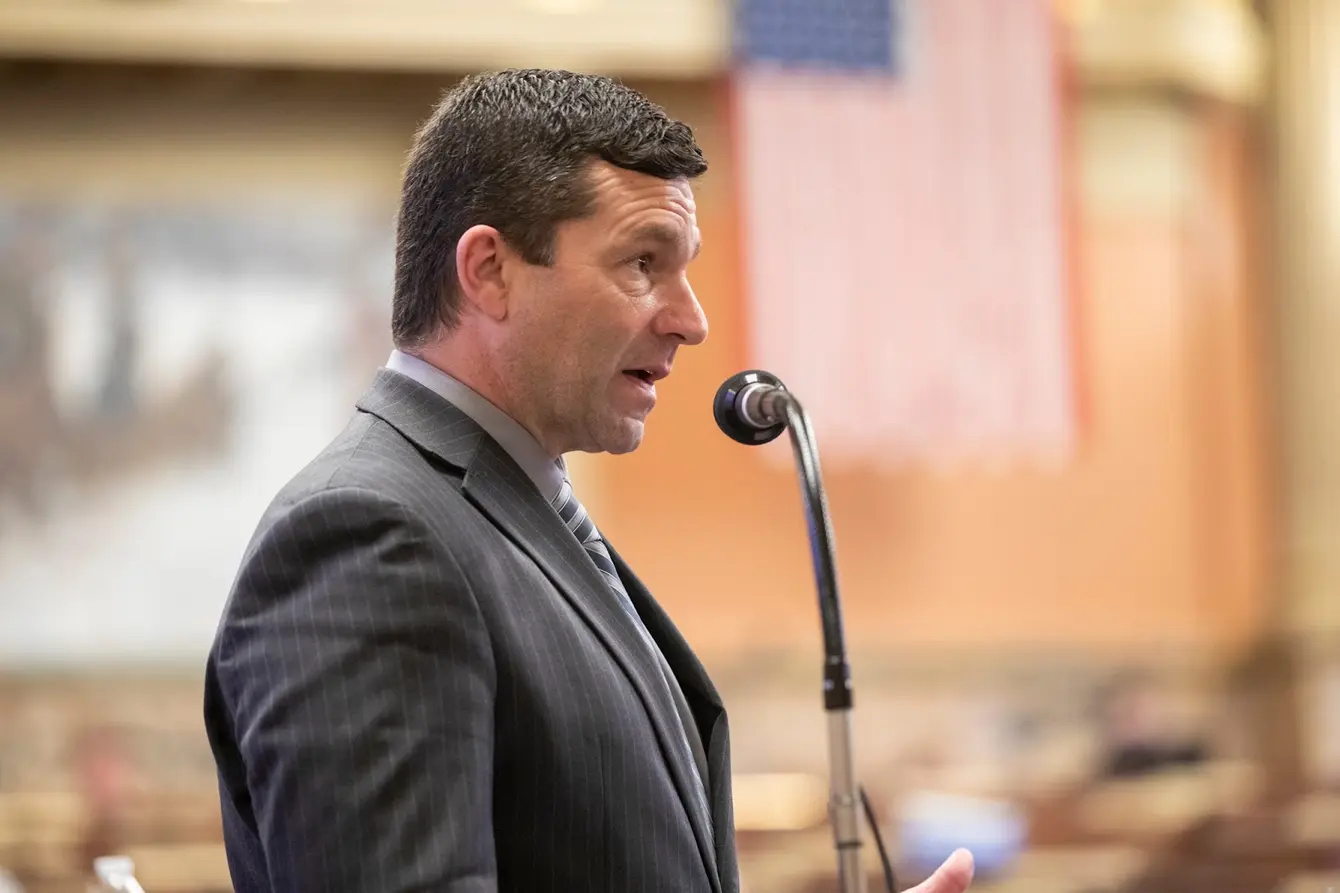
In Harrisburg, Republican state Rep. Jim Struzzi of Indiana County is sponsoring legislation that would legalize syringe services statewide. Struzzi hasn’t always supported this policy, but he says since his brother died from a drug overdose in 2014, he’s come to better understand the nature of addiction.
“I thought, ‘Well, just quit.’ But that’s not possible for people that suffer from substance abuse disorder,” said Struzzi, who in 2022 successfully pushed for the legalization of fentanyl test strips in Pennsylvania. “It really is a disease that needs to be treated like that.”
After visiting Prevention Point Pittsburgh, he said he saw the organization does more than just hand out needles. It connects people to services that could lead to recovery.
“It’s about getting them in front of someone who can help them,” Struzzi said.
In a 2022 letter to lawmakers, officials with the Pennsylvania Society of Addiction Medicine called legalizing syringe services programs their major priority for the year, citing both the potential to decrease “the burden of sickness and suffering” and the cost savings of preventing infections.
Efforts to pass syringe services legislation in Harrisburg have become somewhat more complicated by another debate: supervised consumption sites. These locations provide a place for people to consume or inject previously obtained drugs in a hygienic and monitored environment without fear of arrest, according to the American Society of Addiction Medicine.
The bill to legalize syringe services is currently sitting in the state House Judiciary Committee. Democratic state Rep. Tim Briggs of Montgomery County, who chairs the committee, supports syringe services legalization and opposes efforts to pass a statewide ban on supervised consumption sites. But he worried some lawmakers in Harrisburg would try to combine the two proposals through amendments.
“Over the summer, yeah, that was a real concern,” Briggs said.
Syringe services programs and supervised injection sites are separate public health interventions that are sometimes conflated: Supporters of each say they aim to reduce the harm associated with illicit drugs by making the act of using these substances less dangerous.
Consumption sites are much rarer in the United States than syringe services. Currently, there are two sanctioned ones in the country, both in New York City. Unlike syringe services programs, supervised consumption sites are not listed as one of the core strategies or specifically approved uses in opioid settlement documents.
Shapiro has opposed supervised injection sites for years. In May, the state Senate passed a statewide ban on them, with the support of every Republican and 13 of 22 Democrats in the chamber. Lawmakers in the Democratic-controlled state House haven’t brought the bill up for any votes.
Even in Philadelphia, which historically has had some of the most progressive drug policies in the state, the issue of supervised consumption sites is not getting traction.
In September, Philadelphia City Council overrode Mayor Jim Kenney’s veto and passed a bill that creates several barriers to adding the sites in most of the city. Democrat Cherelle Parker, who was elected mayor in November, publicly opposed the sites during her campaign.
Briggs told Spotlight PA and WESA he plans to put syringes services legislation on his committee’s agenda in the coming weeks or months. He suggested that education efforts — potentially a hearing on the value of syringe services — could build support.
“Then maybe we can get some buy-in to run this clean,” he said.
Struzzi, who does not support supervised injection sites, told Spotlight PA and WESA that he also wants to keep the issues separate.
Back in the basement of the former church in Bolivar, Botteicher is making plans for how her center — FAVOR ~ Western PA — will use a portion of opioid settlement funds.
Westmoreland County commissioner meeting minutes from October describe an approved opioid settlement spending plan for the county that includes $150,000 for community peer support at FAVOR.
Botteicher told WESA and Spotlight PA in mid-November that she was still waiting for the money, which she plans to spend on hiring additional recovery specialists and similar expenses. She said she has other funding and contributions available for the unsanctioned syringe services — a program she sees as integral to getting some clients into recovery and helping others stay healthy if they relapse.
Botteicher thinks syringe services programs remain unsanctioned throughout much of Pennsylvania because of prejudice against people who use drugs and a lack of understanding of addiction. That’s why she’s taking the legal and professional risk of speaking out: by showing the effectiveness of programs like hers, Botteicher hopes it might help spur legislators in Harrisburg to change Pennsylvania’s laws.
“If it’s something that’s going to help someone, then why is it illegal? It just doesn’t make any sense to me,” said Botteicher.
Sarah Boden is a health reporter at WESA in Pittsburgh, Pennsylvania.
Ed Mahon is an investigative reporter with Spotlight PA, based in York, Pennsylvania.
IRA FLATOW: This is Science Friday. I’m Ira Flatow. And now it’s time to check in on the state of science.
SPEAKER 1: This is KERA.
SPEAKER 2: For WWNO–
SPEAKER 3: Saint Louis Public Radio.
SPEAKER 4: Iowa Public Radio News.
IRA FLATOW: Local science stories of national significance, in 38 states it’s legal to distribute syringes for drug use. These sterile syringes are a big part of harm reduction services. Those are efforts to safely prevent drug overdoses. Public health experts are largely in support of this. But in Pennsylvania, a state with one of the highest drug overdose rates in the country, syringe services are in a legal gray zone.
As the state is expecting a windfall from opioid settlement money, these crucial services could be left in the dust. Joining me to talk about this are two reporters who’ve investigated this, Sarah Boden, health reporter for WESA Public Radio in Pittsburgh, Pennsylvania; And Ed Mahon, investigative reporter for Spotlight PA in Harrisburg. Welcome both of you to Science Friday.
ED MAHON: Great to be here.
SARAH BODEN: Thanks for having us.
IRA FLATOW: Ed, $1.6 billion are coming to Pennsylvania. Where exactly is this money coming from?
ED MAHON: That $1.6 billion is coming from drug companies for their role in allegedly fueling the opioid epidemic. That figure includes nearly a dozen companies. Some are manufacturers, some are distributors, and others are retailers. The payment periods vary. Some go as long as 18 years. And there are even additional bankruptcy proceedings that could bring more money to the state.
IRA FLATOW: Wow.
ED MAHON: And people here say that money is desperately needed. Last year more than 5,000 people died from a drug overdose in Pennsylvania. The large majority of those deaths were opioid related and involved fentanyl.
IRA FLATOW: So the money is aimed at reducing those drug overdose deaths?
ED MAHON: Yeah, exactly. So when the bipartisan coalition of attorneys general reached settlements with these drug companies, they put in language describing how the bulk of the money should go to care, treatment, and other programs to address the misuse of opioids. They identified some specifically approved uses and also nine core strategies. Those core strategies include naloxone– the drug that can reverse opioid overdoses, expansion of recovery services, treatment for people in jail, and also expanding syringe services. And these programs do a lot of things, including allowing people to access sterile syringes and injection equipment.
IRA FLATOW: Now, Sarah, let’s get into that a bit. Because as we all know there’s a lot of controversy around syringe services. What’s the public health reasoning behind this intervention?
SARAH BODEN: Sure. So people who use illicit drugs often reuse and share needles, and doing this exposes folks to a whole bunch of health issues, including skin and soft tissue infections. And this can sometimes lead to skin necrosis and sepsis. And also sharing needles can result in the transmission of blood-borne viruses like HIV and Hep C. We’re talking about serious potentially life threatening or life-long health complications. And so by providing people sterile syringes, it can prevent these serious health issues.
IRA FLATOW: So that’s well known. There’s data to back that up?
SARAH BODEN: Yeah, definitely. Particularly when it comes to blood-borne viruses, the Centers for Disease Control and Prevention says that syringe service programs are associated with a 50% reduction in HIV and Hep C virus incidents. The question about whether or not it prevents skin infections hasn’t been studied as much, though because of issues like sepsis or endocarditis which can occur with people who use injection drugs, health care professionals say syringe services are a very important public health intervention.
Also, something important to note is that oftentimes when public health workers are distributing syringes, they’ll provide wound care which can head off more serious complications. Also, I want to note that syringe services can also be an important catalyst to get people into addiction treatment. In fact, people who enter recovery, data show that they’re more likely to be successful in that treatment as well. And that’s because syringe services, they really make a point of meeting people where they are without judgment and that can provide people the mental and emotional safety to make an honest assessment of their life and then seriously consider treatment, which of course, is a really big commitment.
IRA FLATOW: Right, right. And I know you spoke with people who work for syringe service programs, right?
SARAH BODEN: Yeah, definitely. And what I heard from them is just frankly, a lot of pragmatism for the reasons I cited. They’re like, this is an effective way to help people be healthier who use drugs. So why wouldn’t we do this? And a lot of people are willing to take the legal risk of running an unsanctioned syringe service program because either they have used injection drugs in the past or there’s somebody who they love who is currently an injection drug user or is in recovery. And so for them it’s very much a calling.
One person Ed and I spoke to in our reporting is this woman named Kim Botteicher. She runs a small syringe service program in a very rural part of Western Pennsylvania. And this is what she told me about why she’s willing to take the legal risk of doing what she does.
[AUDIO PLAYBACK]
– So we’re just trying to keep people from getting the diseases that are just not necessary to be getting. And are they going to quit overnight because we ask them to? Nope. So let’s help them stay well until we can get them to that point.
[END PLAYBACK]
IRA FLATOW: And Ed, what’s the legal landscape of syringe services in Pennsylvania? If people distribute syringes, are they in legal jeopardy?
ED MAHON: So in Pennsylvania it’s a misdemeanor crime to possess or distribute drug paraphernalia. And the state’s definition of drug paraphernalia includes syringes, needles, and other objects used or intended to be used to inject illicit drugs. So to answer your question, yes they are because unlike a number of other states, we don’t have an exception for people who are providing syringes as a harm reduction approach.
And one thing I’ll note is that decades ago, officials in Philadelphia and Allegheny County created legal protections for people operating these programs. They argued they had the power to do so because of their public health power. But in most or all of the rest of the state, syringe service operators don’t have those protections.
IRA FLATOW: So Ed, what would it take then to change Pennsylvania’s laws? Do you think that’s likely to happen even?
ED MAHON: So we spoke with a Republican lawmaker who’s trying to do just that, to change the law. Jim Struzzi of Indiana County lost his brother to a drug overdose in 2014. And we have a clip of him here describing how that has changed his own thinking about these issues.
[AUDIO PLAYBACK]
– I don’t think he had the proper resources at the time. And I didn’t fully understand addiction myself. I thought, well just quit. But that’s not possible for people that suffer from substance abuse disorder. It really is a disease that needs to be treated like that.
[END PLAYBACK]
His legislation would create an exception in our drug paraphernalia law for syringe service programs. But the politics here are tricky on this and many other issues. We have a Democratic governor, a Republican controlled Senate, and Democrats have held a one-seat majority in the State House for much of the year. But many other states have done this. And there’s a lot of opioid settlement money coming in. And the decisions that happen now about how to spend that money are expected to have an impact in the long term.
IRA FLATOW: Well, we all know about Pennsylvania politics and how closely they are watched. We will be watching with you. Thank you both for taking time to be with us today.
ED MAHON: Thank you so much.
SARAH BODEN: Thanks for having us.
IRA FLATOW: Sarah Boden, health reporter for WESA Public Radio in Pittsburgh; and Ed Mahon, investigative reporter for Spotlight PA in Harrisburg. And if you want to read the full story, please, you can visit our website, sciencefriday.com/exchange.
Copyright © 2023 Science Friday Initiative. All rights reserved. Science Friday transcripts are produced on a tight deadline by 3Play Media. Fidelity to the original aired/published audio or video file might vary, and text might be updated or amended in the future. For the authoritative record of Science Friday’s programming, please visit the original aired/published recording. For terms of use and more information, visit our policies pages at http://www.sciencefriday.com/about/policies/
Kathleen Davis is a producer and fill-in host at Science Friday, which means she spends her weeks researching, writing, editing, and sometimes talking into a microphone. She’s always eager to talk about freshwater lakes and Coney Island diners.
Ira Flatow is the founder and host of Science Friday. His green thumb has revived many an office plant at death’s door.